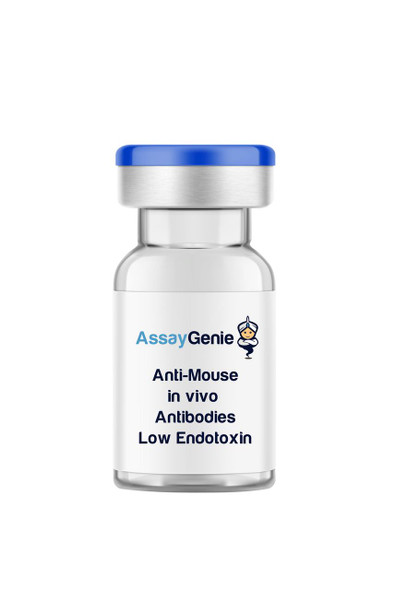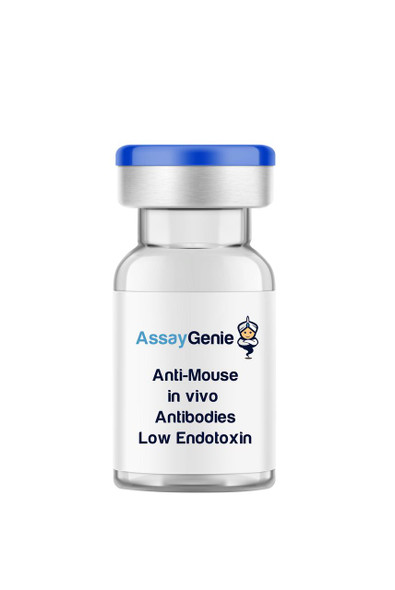Anti-Mouse CD80 In Vivo Antibody - Low Endotoxin
- SKU:
- IVMB0066
- Product Type:
- In Vivo Monoclonal Antibody
- Clone:
- 16-10A1
- Protein:
- B7-1
- Isotype:
- Armenian Hamster IgG
- Reactivity:
- Mouse
- Synonyms:
- B7-1
- Synonyms:
- B71
- Synonyms:
- Ly53
- Synonyms:
- TSA1
- Synonyms:
- Cd28l
- Synonyms:
- Ly-53
- Synonyms:
- MIC17
- Research Area:
- Immune Checkpoint & Cancer Biology
- Endotoxin Level:
- Low Endotoxin
- Host Species:
- Armenian Hamster
- Applications:
- Blocking
- Applications:
- CyTOF
- Applications:
- IP
- Applications:
- WB
Description
| Product Name: | Anti-Mouse CD80 In Vivo Antibody - Low Endotoxin |
| Product Code: | IVMB0066 |
| Size: | 1mg, 5mg, 25mg, 50mg, 100mg |
| Clone: | 16-10A1 |
| Protein: | B7-1 |
| Product Type: | Monoclonal Antibody |
| Synonyms: | B7-1, B71, Ly53, TSA1, Cd28l, Ly-53, MIC17 |
| Isotype: | Armenian Hamster IgG |
| Reactivity: | Mouse |
| Immunogen: | Purified Recombinant Mouse CD80 (>98%) |
| Applications: | B, CyTOF®, IP, WB |
| Formulation: | This monoclonal antibody is aseptically packaged and formulated in 0.01 M phosphate buffered saline (150 mM NaCl) PBS pH 7.2 - 7.4 with no carrier protein, potassium, calcium or preservatives added. |
| Endotoxin Level: | < 1.0 EU/mg as determined by the LAL method |
| Purity: | ≥95% monomer by analytical SEC >95% by SDS Page |
| Preparation: | Functional grade preclinical antibodies are manufactured in an animal free facility using only In vitro protein free cell culture techniques and are purified by a multi-step process including the use of protein A or G to assure extremely low levels of endotoxins, leachable protein A or aggregates. |
| Storage and Handling: | Functional grade preclinical antibodies may be stored sterile as received at 2-8°C for up to one month. For longer term storage, aseptically aliquot in working volumes without diluting and store at -80°C. Avoid Repeated Freeze Thaw Cycles. |
| Applications: | B, CyTOF®, IP, WB |
| Reactivity: | Mouse |
| Host Species: | Armenian Hamster |
| Specificity: | Clone 16-10A1 recognizes an epitope on mouse CD80. |
| Antigen Distribution: | CD80 is expressed on activated B cells, monocytes/macrophages, and dendritic cells. |
| Immunogen: | Purified Recombinant Mouse CD80 (>98%) |
| Concentration: | ≥ 5.0 mg/ml |
| Endotoxin Level: | < 1.0 EU/mg as determined by the LAL method |
| Purity: | ≥95% monomer by analytical SEC >95% by SDS Page |
| Formulation: | This monoclonal antibody is aseptically packaged and formulated in 0.01 M phosphate buffered saline (150 mM NaCl) PBS pH 7.2 - 7.4 with no carrier protein, potassium, calcium or preservatives added. |
| Preparation: | Functional grade preclinical antibodies are manufactured in an animal free facility using only In vitro protein free cell culture techniques and are purified by a multi-step process including the use of protein A or G to assure extremely low levels of endotoxins, leachable protein A or aggregates. |
| Storage and Handling: | Functional grade preclinical antibodies may be stored sterile as received at 2-8°C for up to one month. For longer term storage, aseptically aliquot in working volumes without diluting and store at -80°C. Avoid Repeated Freeze Thaw Cycles. |
CD80 is a highly glycosylated 60 kD protein that is part of the Ig superfamily and is significantly involved in immune cell activation in response to pathogens. CD80 is closely related to, and works in tandem with CD86 (B7-2) to prime T- cells. CD80 binds to CTLA-4 to deliver an inhibitory signal to T cells. The ligation of CD28 on T cells with CD80 and CD86 on APCs co-stimulates T cells resulting in enhanced cell activation, proliferation, and cytokine production. It is thought that CD80 interacts with a ligand on Natural Killer cells, activating the Natural Killer cell-mediated cell death of the CD80 carrier. The activation of Natural Killer cell-mediated death via CD80 interactions has potential as a possible cancer immunotherapy through the induction of CD80 expression on tumor cells.
| Technical Datasheet: | View |
| Protein: | B7-1 |
| Function: | T cell costimulation |
| Ligand/Receptor: | CD28 (stimulatory), CD152(CTLA4) (inhibitory) |
| Research Area: | Cell Biology, Costimulatory Molecules, Immunology, Neuroscience, Neuroscience Cell Markers |

| Armenian Hamster IgG Isotype Control | |
|---|---|
| Clone | PIP |
| Isotype | Armenian Hamster IgG |
| Endotoxin Level | Low Endotoxin |
Meet the team!
Shane Costigan
Territory Manager & Team Lead
Abdul Khadim
Sales Executive






